Rosen Method, An approach to wholeness and well-being through the body
by Elaine Mayland
Although this book was written for Rosen Method students, I recommend it for anyone who wants to deepen their experience of the work. Rosen Method sessions can be very subtle, and the work is not easily conveyed in a few words. This book discusses how unconscious material is stored in the body, how Rosen Method works with this material, and the benefits clients experience. The author is a long-time close associate of Marion Rosen, a senior teacher, and a director of European training centers.
[back to top]
|
|
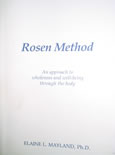 |
|
|
|
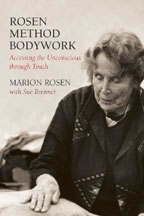 |
|
Rosen Method Bodywork: Accessing the Unconscious through Touch
by Sue Brenner and Marion Rosen
From the publisher’s description:
“The body never lies” in the Rosen Method and, through touch, will reveal repressed feelings disguised as chronic pain. Once accessed, the patient can begin to process those feelings toward recovery. This book contains an explanation of the theory and practice of Rosen Method along with case studies that show how specific disorders are successfully treated. Photos and illustrations are provided to further explore the philosophy and mechanics of this revolutionary therapy that addresses emotional and physical ailments through touch.
“When people know themselves and can fully be who they are, an authenticity — an intimate, personal knowledge of oneself — comes through. By touching with receptive, listening hands we create the space for this voice to arise from within patients. Freeing the breath to move fully through the body supports this knowledge, and when this happens, transformation becomes possible.”
[back to top]
|
|
|
|
The Rosen Method: Coming Alive and Staying Alive in the 21st Century
by Marilyn Davis
The emphasis in this book is on the concept of presence. For a practitioner, a Rosen Method session is like being in a meditative state. The practitioner is totally present to the client and completely accepting of who the client is in this moment. She can often sense through her hands the unconscious history of the client, stored in the body. For the author of this book, Rosen Method is similar to her ministry as a Franciscan Sister. Both are ways of being that express presence in daily life.
[back to top]
|
|
 |
|
|
|
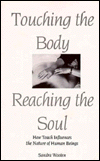 |
|
Touching the Body, Reaching the Soul, How Touch Influences the Nature of Human Beings
by Sandra Wooten
Sandra Wooten was one of Marion Rosen’s first students in the 1970’s. She is the director of the Rosen Method Center Southwest in Sante Fe, New Mexico. In the first chapter she discusses her personal history and shares the following:
“[As a child,] I learned to keep my emotions to myself and not ask for what I wanted and needed. I did this by physically contracting. I learned to have no expectations that anyone in my family was interested in how I felt or who I was. . I did not know I was emotionally neglected or that my mother was critical and cold to me until much later, when I had a family of my own. I was just living my life. We appeared to be a happy family . . I did not know something essential was missing for me: My mother’s touch.”
Rosen Method is known for its work with traumatic childhood experiences, such as sexual abuse, but it’s also very effective in healing the more subtle abuses of childhood. There are many paths to losing touch with who we really are. Rosen Method is about reconnecting to the self we once lost.
[back to top]
|
|
|
|
Bodywork, What type of massage to get — and how to make the most of it
by Thomas Claire
I’m very partial to this book, both because I think it’s excellent and because this is where I first learned about Rosen Method. The author was a Fulbright scholar and a successful financial analyst who changed careers in mid-life. He became a massage therapist and Shiatsu practitioner and, as often happens to people who fall in love with bodywork, went on to study many bodywork styles.
But this book is not about the author. It contains sixteen chapters, each of which describes and explains a different type of bodywork. What’s unique and especially useful is the author’s detailed description, for each modality, of exactly what it’s like to receive a session. The book can be extremely helpful in identifying the type of work that most appeals to you.
[back to top]
|
|
 |
|
|
|
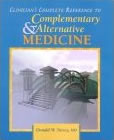 |
|
Clinician’s Complete Reference to Complementary and Alternative Medicine
by Donald Novey, MD
This is another book that contains an excellent chapter on Rosen Method. Here’s a quotation:
“At its best, Rosen Method bodywork is a means of contacting the unconscious through the body. A skilled practitioner can run the hand lightly over patients’ bodies and ‘read’ from their life experiences and know something of the pains they have suffered and the choices they have made as a result.
“The practitioner’s intention is to be engaged with a whole person, the totality of the person’s being. Through this connection, the practitioner can sometimes catch a glimpse of the totality of the person’s life and essential truth as it presents itself in a moment in time. The practitioner may be able to hold a mirror at such an angle that patients can come into the experience of themselves as a whole being.”
[back to top]
|
|
|
|
An Invitation to Surrender, Rosen Method Bodywork
produced and recorded by Evelyn Miller
This is a CD of Marion and a senior teacher (Gloria Hessellund) talking about the work. It was recorded at Spirit Rock Meditation Center on July 30, 2000 during the introductory remarks preceding a seminar. The discussion includes both an overview of the work and insights inspired by questions from the audience. It’s always wonderful to hear Marion speak. The CD is available from the producer at her website.
[back to top]
|
|
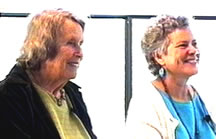 |
|
|
|
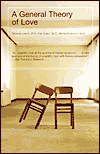 |
|
A general theory of love
by Thomas Lewis, Fari Amini, and Richard Lannon
The authors — San Francisco professors of psychiatry — apply new research on brain function to emotional bonding. Findings from the neuroscience of emotions indicate that our nervous systems are actually modified throughout our lives by the people who are closest to us. I found this book thought provoking, fascinating, and highly compatible with my experience as a Rosen Method practitioner.
[back to top]
|
|
|
|
Molecules of Emotion: The Science behind Mind-Body Medicine
by Candace Pert
Much of this book is a behind-the-scenes look at high level, big stakes scientific research, complete with intrigue, aggressive competition, and Pert’s exclusion from the recognition she felt she deserved. What’s relevant to Rosen Method is Pert’s research on neuropeptides.
Rosen Method practitioners know from experience that emotions are stored in the body. Pert’s theories provide a possible scientific explanation. She considers neuropeptides and their receptors as links in a dynamic information network that connects the material world of the body with the nonmaterial world of emotions and the mind. Her research provides clues to understanding the elusive mind/body connection.
[back to top]
|
|
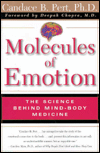 |
|
|
|
 |
|
Another interview from Bay Area Business Woman
This is an interview from April 2003, entitled Getting in Touch with Healing, and it’s by Shawn McAndrew. Marion refers to Sara Webb, who was present during the interview. Sara was Marion’s first student, and she was my Rosen Method supervisor.
[back to top]
|
|
|
|
Rosen Method training centers and organizations
Rosen Method training centers are not simply for training practitioners. The “training” is not limited to individuals who plan to practice the work, but is open to anyone who’d like to experience the benefits of Rosen Method. Many people attend Rosen Method intensives for their own personal growth. It’s an excellent way to make a quantum leap on the path of one’s personal process.
[back to top]
|
|
 |
|
Rosen Method Practitioner Listing
Here is a direct link to Rosen Method Practitioners throughout the world. This directory includes practitioners and interns who are members of the Rosen Method Professional Association.
[back to top]
|
|
|
|
 |
|
Rosen Method Open Center
The Rosen Method Open Center is a team of certified practicioners and training teachers committed to bringing Rosen Method Bodywork and Movement to communities in North America and around the world. They will travel to your area and provide personal and professional education in Rosen Method Bodywork and Movement. Their website has extensive information on their training, services, and practitioners.
[back to top]
|
|
 |
|
Rosen Method: The Berkeley Center
This is where I received my training and attended intensives. All Rosen Method Centers offer weeklong intensives — a powerful, in-depth experience of the work. Marion Rosen still teaches intensives through the Berkeley Center.
[back to top]
|
|
|
|
 |
|
Rosen Method Center Southwest
The Southwest Center is in Sante Fe, New Mexico. Intensives are residential, which is a great way to experience the work. They include time to explore a creative process (pottery, mask-making, writing), as well as an opportunity to participate in a sweat lodge ceremony led by master potter and shaman, Felipe Ortega.
[back to top]
|
|
|
|
|
|
 |
 |
 |























